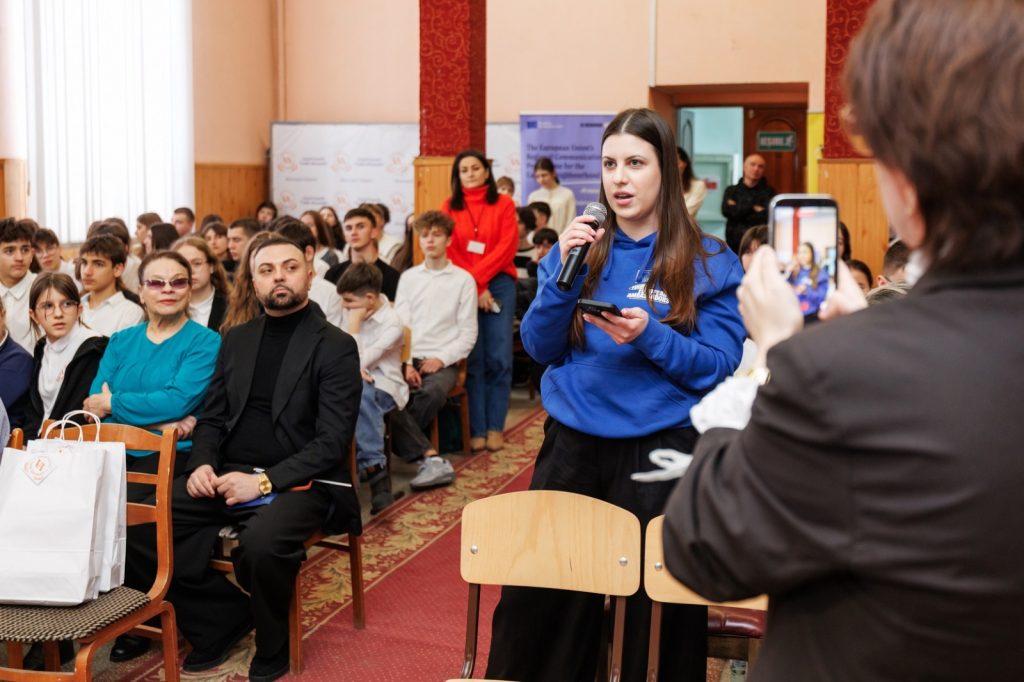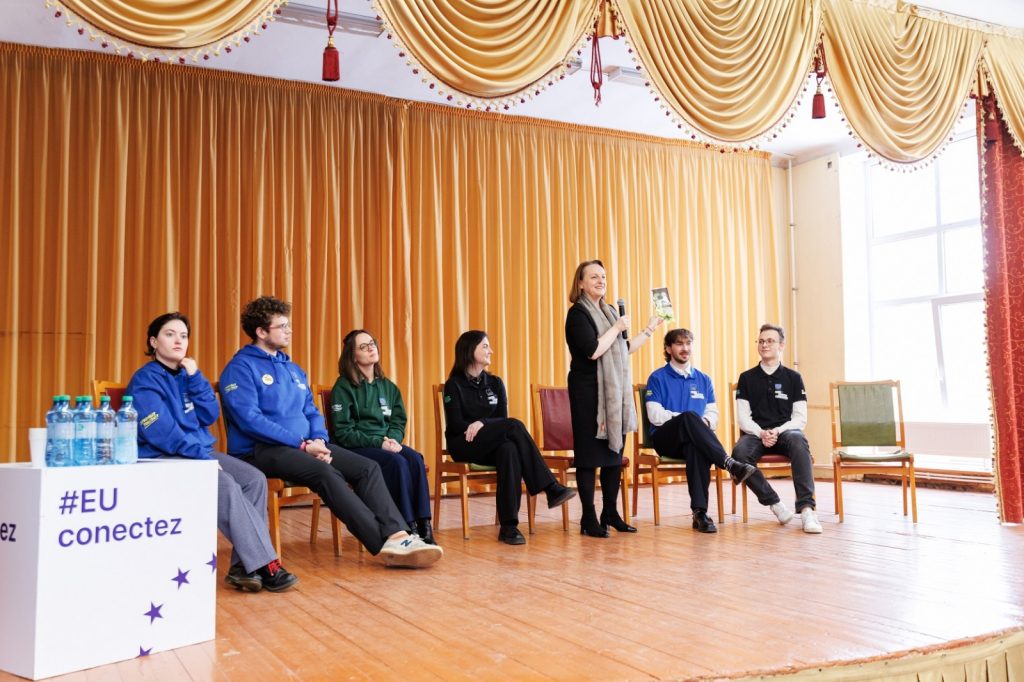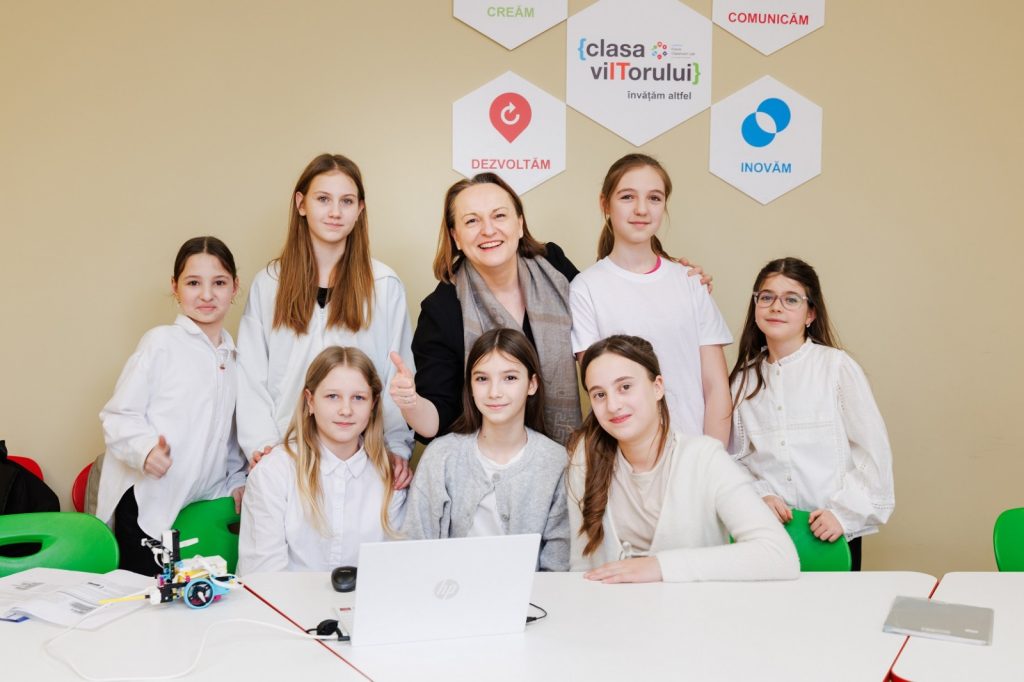Over 80 students from the “Vasile Alecsandri” Theoretical High School in Chișinău learned more about the European Union (EU) during the event “More EU in Moldova,” organized by the Young European Ambassadors (YEA) together with the EU Delegation to the Republic of Moldova. The students explored an interactive EU–YEA fair and participated in an open […]
Over 80 students from the “Vasile Alecsandri” Theoretical High School in Chișinău learned more about the European Union (EU) during the event “More EU in Moldova,” organized by the Young European Ambassadors (YEA) together with the EU Delegation to the Republic of Moldova. The students explored an interactive EU–YEA fair and participated in an open dialogue with Iwona Piórko, EU Ambassador to Moldova, and content creator Cătălin Lungu.
The activity brought together six Young European Ambassadors from the Republic of Moldova and five peers from Romania, France, Italy, and Ukraine, strengthening cross-border dialogue and the exchange of experiences between youth from EU member states and Moldova. The EU–YEA fair included thematic stands organized by the Young European Ambassadors and the StratCom project team. Through interactive games, quizzes, and informal discussions, students tested their knowledge about the European Union, discovered relevant information about Europe, and learned more about the concrete results of EU–Moldova cooperation.

The event continued with a joint presentation that brought together students from multiple classes and addressed key topics, including EU-Moldova cooperation, the core values of the European Union, the country’s accession process, and the Economic Growth Plan for the Republic of Moldova, the largest financial support package provided by the EU. The session concluded with an interactive contest organized by the Young European Ambassadors, encouraging active participation and open dialogue.
Addressing the students, Iwona Piórko, EU Ambassador to the Republic of Moldova, stated: “Supporting and empowering young people is a key priority for the European Union. That is why programs like Erasmus+, EU4Youth, internships, exchanges, and training exist — to open doors, help you connect, and provide the tools you need to grow and develop. But these opportunities make a difference only if you choose to take a step forward. Be curious. Be courageous. Apply, get involved, ask questions, challenge ideas, and bring your energy to your communities. Your voice matters in shaping Moldova’s future, so dare to use it.”

Organized at a defining moment for the relations between the European Union and Moldova and for the country’s European path, the initiative aims to engage young people and the wider public through accessible and interactive activities, highlighting the EU’s role as a strategic partner and its support for future generations. Valeria Cabac, Young European Ambassador in Moldova, said: “It is inspiring to see how motivated students are to learn more about the EU and Moldova’s European path. These meetings help young people feel more confident in their role in shaping the future,” while Juliette Coiffard, Young European Ambassador from the EU, added: “Such meetings demonstrate the importance of dialogue with young people for strengthening mutual understanding between Moldova and the European Union. Young people are at the center of our shared European future.”

The event in Chișinău marks the beginning of a series of awareness-raising activities that will involve a total of three schools. The program will continue in Ungheni and Soroca until February 26, with further school visits, EU-YEA fairs, and discussions focused on youth opportunities and EU-Moldova cooperation. Host schools are part of the national network of Euro Clubs and EU Information Centers. Across Moldova, 30 such entities function as local engagement platforms, organizing activities and facilitating discussions on European topics within their communities.
Context
The Young European Ambassadors (YEA) initiative is a non-political, voluntary, and vibrant communication network that connects and builds bridges of friendship among youth from Armenia, Azerbaijan, Belarus, Georgia, Moldova, Ukraine, EU member states, and the United Kingdom. The network’s goal is to raise awareness about EU cooperation with Eastern Partnership countries, present tangible results of this cooperation, contribute to political dialogue on various topics, enhance civic activism, and work together for a better future. The YEA initiative was launched by the European Union in 2016 and has involved over 1,700 young people from more than 34 countries to date.
Young European Ambassadors | Young European Ambassadors in Moldova
EU Delegation to Moldova
The “Strategic Communication and Media Support in the Republic of Moldova” (StratCom) project aims to strengthen public understanding of the partnership between the European Union and Moldova, promote access to credible information, and reinforce democratic resilience. Website: www.eu4moldova.eu
EUNEIGHBOURS EAST is a regional communication program funded by the European Union, aiming to improve EU communication in Eastern Partnership countries, strengthen public understanding of the European Union and its policies, and increase societal resilience against disinformation. The program complements and supports the communication activities of EU Delegations in partner countries and operates under the coordination of the Directorate-General for Enlargement and Neighbourhood Policy of the European Commission and the European External Action Service. Website: www.euneighbourseast.eu